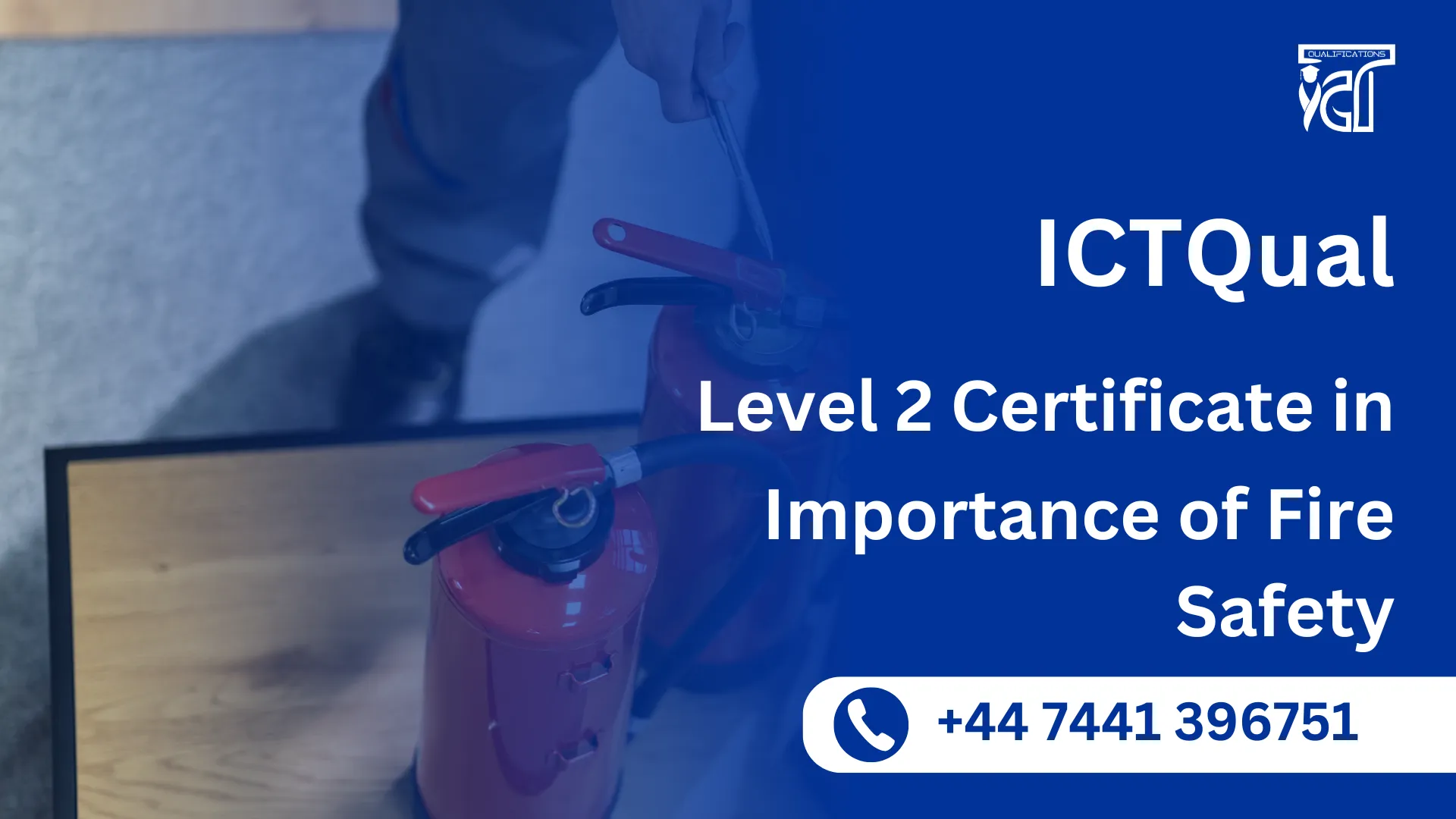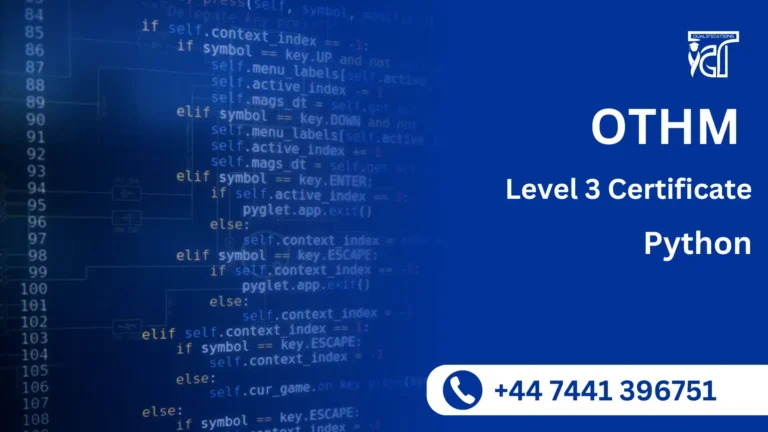Fire safety is a critical concern in any workplace, and having the right knowledge and training can make all the difference when it comes to preventing fires and handling emergencies. The ICTQual Level 2 Certificate in Importance of Fire Safety provides employees and employers with the necessary skills to understand fire hazards, mitigate risks, and comply with fire safety regulations. This certification equips professionals with the essential expertise to ensure workplace safety and reduce the risk of fire-related incidents.
The ICTQual Level 2 Certificate in Importance of Fire Safety is a comprehensive training program designed to give participants a strong foundation in fire safety principles. It covers key topics such as fire prevention, fire risk assessment, emergency response, and understanding the legal requirements surrounding fire safety in the workplace.
By completing the ICTQual Level 2 Certificate, learners will develop the skills to identify potential fire hazards, implement fire prevention measures, and react appropriately in the event of a fire. This course is recognized for its practical approach and relevance to both large organizations and small businesses alike.
Fire safety training is essential for every organization, as fire hazards are present in most environments. Whether it’s an office, factory, healthcare facility, or retail store, understanding fire safety protocols is crucial for the protection of life, property, and the business itself. Proper fire safety training can help prevent fires, reduce the potential for injuries, and ensure that employees know how to act during a fire emergency.
The ICTQual Level 2 Certificate in Importance of Fire Safety addresses this need by educating employees on fundamental fire safety practices and creating a safer working environment.
The ICTQual Level 2 Certificate in Importance of Fire Safety is a vital qualification for anyone looking to enhance their knowledge of fire safety and create a safer workplace. Whether you’re an employee, manager, or business owner, this certification ensures that you have the practical skills to manage fire risks, prevent incidents, and respond effectively in emergencies.
By investing in fire safety training, organizations not only protect their employees but also reduce the likelihood of costly fire-related incidents. This certification plays an essential role in helping companies comply with legal requirements, enhance workplace safety, and cultivate a culture of responsibility and care.
For more information on the ICTQual Level 2 Certificate in Importance of Fire Safety, or to enroll in the course, visit [Insert website or contact details here].
ICTQual Level 2 Certificate in Importance of Fire Safety
The ICTQual Level 2 Certificate in Importance of Fire Safety qualification consists of 6 units for the completed qualification.
- Understanding Fire Development and Risk Factors
- Fire Safety Legislation and Compliance Standards
- Identifying, Preventing, and Controlling Fire Hazards
- Emergency Planning and Fire Evacuation Strategies
- Workplace Fire Safety Culture and Training
- Inspection and Maintenance of Fire Safety Equipment
GLH (Guided Learning Hours) and TQT (Total Qualification Time) are terms commonly used in vocational qualifications to help define the amount of time a learner is expected to spend on their studies.
1. GLH (Guided Learning Hours)
GLH refers to the number of hours a learner spends being directly taught, supervised, or supported during their course. This includes the time spent in activities such as:
- Classroom instruction
- Practical workshops
- One-on-one tutoring or mentoring sessions
- Online learning sessions with tutor support
In other words, GLH represents the time that learners are actively engaged with their instructors or learning activities.
2. TQT (Total Qualification Time)
TQT represents the total amount of time a learner is expected to invest in completing a qualification, including:
- GLH (Guided Learning Hours): Time spent on direct learning, as explained above.
- Self-Directed Learning: This includes time spent on independent study, research, assignment completion, preparation for exams, and any other work the learner does outside of direct teaching hours.
TQT is a broader measure that includes all the time required to achieve the qualification. It helps learners and employers understand the overall commitment required for the qualification.
Key Differences Between GLH and TQT:
- GLH focuses on direct learning with guidance or supervision.
- TQT includes GLH as well as independent study time and other learning-related activities.
Example:
If a qualification has a TQT of 600 hours and a GLH of 250 hours, it means the learner should spend 250 hours in direct learning (classroom, online, or tutor-led sessions) and 350 hours on independent study or research.
Here are the learning outcomes for each study unit:
Understanding Fire Development and Risk Factors
- Explain how fires develop and spread.
- Identify key risk factors that contribute to fire incidents.
Fire Safety Legislation and Compliance Standards
- Learn about national and international fire safety standards.
- Understand the importance of compliance in different industries.
Identifying, Preventing, and Controlling Fire Hazards
- Recognise various fire hazards and prevention methods.
- Learn how to implement fire hazard control strategies.
Emergency Planning and Fire Evacuation Strategies
- Understand how to develop emergency fire response plans.
- Learn about different evacuation techniques for various environments.
Workplace Fire Safety Culture and Training
- Understand the importance of fostering a fire safety culture.
- Learn methods to implement fire safety training programmes.
Inspection and Maintenance of Fire Safety Equipment
- Recognise the importance of inspecting fire safety equipment.
- Learn procedures for proper maintenance and testing.
The ICTQual Level 2 Certificate in Importance of Fire Safety offers numerous benefits for individuals and organizations alike, providing essential fire safety knowledge and practical skills. Below are the key benefits of undertaking this course:
1. Comprehensive Understanding of Fire Safety Principles
- The course offers a thorough understanding of fire safety basics, including how fires start, spread, and the risks they pose. Learners will gain knowledge of fire prevention techniques and strategies to protect people and property from fire hazards.
2. Enhanced Workplace Safety
- By learning fire safety fundamentals, employees can actively contribute to a safer working environment. Understanding the identification of fire hazards and proper response strategies helps reduce the likelihood of fire incidents in the workplace.
3. Compliance with Legal Fire Safety Requirements
- This course ensures that organizations meet essential fire safety regulations, such as the Regulatory Reform (Fire Safety) Order 2005. It helps organizations stay compliant with fire safety laws, reducing the risk of fines, legal issues, and potential liabilities.
4. Improved Emergency Preparedness
- Learners are trained to respond effectively during fire emergencies, including how to evacuate safely and use fire extinguishers correctly. The knowledge gained prepares individuals to act quickly and calmly in case of a fire, minimizing potential harm.
5. Fire Risk Assessment Skills
- The course teaches how to conduct fire risk assessments, allowing individuals to identify and mitigate fire hazards in their workplaces. These skills are crucial for developing fire safety plans and improving overall safety protocols.
6. Cost Savings for Organizations
- By preventing fire-related incidents, this course helps organizations save on insurance premiums, avoid damage to property, and reduce the costs associated with potential business downtime in the event of a fire.
7. Strengthened Safety Culture
- The ICTQual Level 2 Certificate promotes a proactive safety culture within the organization. Employees become more aware of fire risks and safety practices, leading to a more responsible and safety-conscious workforce.
8. Career Advancement Opportunities
- For individuals working in health and safety, facilities management, or other safety-critical roles, the qualification can enhance their professional profile and open up opportunities for career progression. It demonstrates a commitment to maintaining a safe work environment.
9. Practical Application in Various Industries
- This course is relevant across a wide range of industries, including healthcare, retail, construction, hospitality, and manufacturing, where fire safety is a critical concern. It provides practical, industry-specific knowledge that can be directly applied to real-world scenarios.
10. Increased Confidence in Handling Fire Emergencies
- The training boosts confidence in employees, equipping them with the skills needed to handle fire-related emergencies calmly and competently. Knowing what to do in an emergency helps reduce panic and increases the chances of a successful evacuation.
11. Flexible Learning Options
- The ICTQual Level 2 Certificate offers flexible learning options, including online or in-person courses, allowing learners to complete the certification at their own pace while balancing work and personal commitments.
12. Widely Recognized Certification
- The ICTQual Level 2 Certificate is recognized by employers and industry professionals, enhancing the credibility of those who hold the qualification. It serves as proof of an individual’s commitment to workplace safety and fire prevention.
In summary, the ICTQual Level 2 Certificate in Importance of Fire Safety is a valuable qualification for both employees and employers. It helps reduce fire risks, improves emergency preparedness, ensures legal compliance, and promotes a culture of safety. Whether you’re looking to advance your career in health and safety or enhance the safety standards within your organization, this course provides the essential knowledge and skills needed to create a safer, more compliant workplace.
The ICTQual Level 2 Certificate in Importance of Fire Safety is an ideal fit for a wide range of individuals and organizations who want to improve their fire safety knowledge and practices. Here’s a breakdown of the best candidates for this course:
1. Employees in High-Risk Work Environments
- Who They Are: Individuals working in sectors such as construction, manufacturing, healthcare, hospitality, and retail, where fire hazards are more prevalent.
- Why It’s a Good Fit: These workers will benefit from learning fire prevention techniques, understanding fire risks, and knowing how to respond during fire emergencies. This knowledge is crucial for creating a safer working environment and minimizing potential fire-related incidents.
2. Health and Safety Professionals
- Who They Are: Professionals responsible for ensuring the safety and well-being of employees in various industries.
- Why It’s a Good Fit: The course offers in-depth knowledge of fire safety principles, enabling health and safety officers to enhance their fire safety programs, conduct risk assessments, and develop effective fire emergency plans for the workplace.
3. Facilities Managers
- Who They Are: Individuals responsible for the maintenance and safety of buildings, facilities, and premises.
- Why It’s a Good Fit: Facilities managers need to ensure their buildings comply with fire safety regulations. This course helps them implement fire safety measures, conduct risk assessments, and create emergency response plans to safeguard both employees and the property.
4. Small Business Owners and Managers
- Who They Are: Entrepreneurs and business managers overseeing small to medium-sized enterprises, such as retail stores, offices, or restaurants.
- Why It’s a Good Fit: Small business owners and managers are often responsible for the safety of their employees and customers. The course helps them identify fire risks in their premises, implement fire safety practices, and ensure compliance with legal fire safety regulations.
5. Security Personnel
- Who They Are: Security officers working in various facilities, including offices, hospitals, schools, and shopping centers.
- Why It’s a Good Fit: Security personnel play a critical role in responding to fire emergencies. This course teaches them how to assess fire risks, use fire safety equipment, and lead evacuations, ensuring they are prepared to manage fire situations efficiently.
6. Supervisors and Managers
- Who They Are: Supervisors and managers who are responsible for the safety of teams or departments.
- Why It’s a Good Fit: Supervisors and managers will benefit from a better understanding of fire safety regulations and emergency procedures, enabling them to guide their teams in ensuring workplace safety. They will be better equipped to handle fire emergencies and ensure compliance with fire safety laws.
7. Aspiring Fire Safety Officers
- Who They Are: Individuals looking to pursue a career in fire safety and emergency management.
- Why It’s a Good Fit: This course provides foundational knowledge for those aiming to work as fire safety officers, fire wardens, or in other fire-related safety roles. It helps develop the practical skills and understanding needed to assess and manage fire risks effectively.
8. Anyone Interested in Improving Personal Fire Safety Knowledge
- Who They Are: Anyone interested in improving their personal understanding of fire safety, including homeowners, community volunteers, or parents.
- Why It’s a Good Fit: The course teaches practical fire safety skills, from preventing fires to responding to emergencies, which are valuable in daily life and can help protect family members and the community in the event of a fire.
9. Organizations Seeking to Enhance Safety Culture
- Who They Are: Companies and organizations looking to improve the overall safety culture within the workplace.
- Why It’s a Good Fit: This course equips organizations with the tools to enhance fire safety awareness among employees, reduce fire risks, and create a culture of safety. It also helps organizations meet regulatory requirements and reduce potential liabilities.
10. Compliance Managers
- Who They Are: Professionals tasked with ensuring that their organization adheres to industry regulations and legal standards.
- Why It’s a Good Fit: The ICTQual Level 2 Certificate ensures that compliance managers can oversee and enforce fire safety protocols effectively, helping the organization maintain compliance with fire safety laws and avoid legal consequences.
In summary, the ICTQual Level 2 Certificate in Importance of Fire Safety is a perfect fit for anyone involved in ensuring safety at the workplace, from employees to business owners to safety officers. It’s an essential course for anyone looking to enhance their fire safety knowledge, ensure compliance with fire regulations, and promote a safer working environment. Whether you’re new to fire safety or looking to advance your expertise, this course offers practical, valuable skills that can be applied across a variety of industries.
Entry Requirements
Register Now
Qualification Process
Qualification Process for the ICTQual Level 2 Certificate in Importance of Fire Safety
- Self-Assessment:
Begin by evaluating your eligibility to ensure you meet the qualification requirements, including work experience, knowledge, and language proficiency. - Registration:
Complete your registration by submitting the required documents, including a scanned copy of a valid ID, and paying the registration fee. - Induction:
An assessor will conduct an induction to confirm your eligibility for the course and explain the evidence requirements. If you do not meet the criteria, your registration will be canceled, and the fee will be refunded. - Assignmnets & Evidence Submission:
Provide all assignmnets and the necessary evidence based on the assessment criteria outlined in the course. If you are unsure of the required evidence, consult with the assessor for guidance on the type and nature of evidence needed. - Feedback and Revision:
The assessor will review your submitted evidence and provide feedback. Evidence that meets the criteria will be marked as “Criteria Met,” while any gaps will be identified. You will be asked to revise and resubmit if needed. - Competence Evidence:
Submit final evidence demonstrating that all learning outcomes have been met. This evidence will be marked as “Criteria Met” by the assessor once it is satisfactory. - Internal Quality Assurance (IQA):
The Internal Quality Assurance Verifier (IQA) will review your evidence to ensure consistency, quality, and compliance with standards. - External Verification:
The IQA will submit your portfolio to ICTQUAL AB External Quality Assurance Verifiers (EQA) for final confirmation. The EQA may contact you directly to verify the authenticity of your evidence. - Certification:
Upon successful completion of all checks, ICTQUAL AB will issue your official certificate, confirming that you have attained the ICTQual Level 2 Certificate in Importance of Fire Safety.







